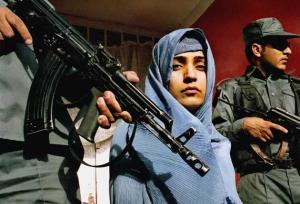Michael Hughes, Examiner.com, November 3, 2010
Joya stated future hope lies in the strengthening and expansion of a national anti-fundamentalist and democracy-loving movement

Afghan human rights activist Malalai Joya wrote in the Guardian on Tuesday that the U.S., NATO and Karzai’s government are the biggest terrorists in the eyes of the Afghan people and asserted that U.S. President Barack Obama has only brought “change” for the worse, characterizing him as nothing more than a “second Bush”.
Joya, who has been called the “bravest woman in Afghanistan” and this year was named by TIME magazine as one of the most influential people in the world, had been suspended from parliament in May 2007 for, rightfully, accusing several colleagues of being warlords and unfit for service in the new Afghan government. She has survived four assassination attempts since and responded to her enemies by declaring:
“Never again will I whisper in the shadows of intimidation. I am but a symbol of my people’s struggle and a servant to their cause. And if I were to be killed for what I believe in, then let my blood be the beacon for emancipation and my words a revolutionary paradigm for generations to come.”
In her recent Guardian piece, Joya called Hamid Karzai an illegitimate puppet who won last year’s Afghan presidential election “as the result of fraud – with ballot stuffing, vote buying and massive corruption reported by the world’s media.” But she also explained why the Afghan people lost faith in Karzai well before the 2009 election:
This was due to the ever increasing corruption of the government, the never-ending crimes of the many fundamentalists and warlords in his regime, and the financial scandals and corruption of his brothers. In Kandahar people even started calling Ahmed Wali Karzai the “little Bush”, after the hated US president.
Joya said the vast majority of Afghans have lost all hope in Karzai while she chastised his latest “peace negotiations” with Taliban elements, because “including killers like Mullah Omar and Gulbuddin Hekmatyar in the government is not about negotiating for peace, but completing the decades-old circle of warlordism and fundamentalism.”
More damaging to Afghanistan than these fraudulent elections, she contended, has been the U.S.-led coalition’s bombing and occupation of her country which has inflicted egregious war crimes and brutalities upon Afghan civilians, a severe toll that had been exposed within the WikiLeaks documents.
Malalai Joya expressed anger at her country’s vulnerable position and frustration at her people’s inability to fight back:
Unfortunately the Afghan people are not yet strong enough to drive out the US, overthrow the mafia government of Karzai and bring an end to the crimes of the Taliban and other fundamentalists. Until both the US and the fundamentalists – of both the Northern Alliance and Taliban brands – are driven out of power in Afghanistan, we cannot see a bright future.
She even mocked Western human rights activists for falling for a TIME cover story featuring a woman disfigured by the Taliban, which she claimed was a clear example of using the plight of women as war propaganda:
The headline – “What happens if we leave Afghanistan” – could have, or should have, been “What happens while we are in Afghanistan”, because crimes of mutilation, rape and murder against women are commonplace today.
Many warlords and commanders aligned with Nato and Karzai carry out their sexist, misogynist crimes with impunity. Time could, for example, have done a cover story condemning the law signed by Karzai in 2009 that legalised crimes against Shia women, or about the shocking levels of women committing suicide by self-immolation.
Finally, Joya stated future hope lies in the strengthening and expansion of a national anti-fundamentalist and democracy-loving movement, but such a movement can be built only by Afghans. She ends by saying “while we want the world’s support and solidarity, we neither need nor want NATO’s occupying forces.”
Although she certainly has a strong message and leads a worthy cause, Joya still lacks a coherent plan for alleviating the barbarous situation. Earlier she had hinted at Afghan powerlessness and admitted her people are ill-equipped to overcome the dark violent forces that enshroud them. On October 23 during a speech at a socialist conference in New York City, she asserted:
“If the U.S. and its allies let us have a little bit of space and peace, then we know what to do with our destiny. The people of Afghanistan don’t want occupation. They need honest support, they need educational support, they need your powerful voice–which means, first of all, international solidarity against the warmongers of your government.”
Noam Chomsky once echoed similar sentiments when he wrote of Ms. Joya:
Malalai Joya leaves us with hope that the tormented people of Afghanistan can take their fate into their own hands if they are released from the grip of foreign powers, and that they can reconstruct a decent society from the wreckage left by decades of intervention and the merciless rule of the Taliban and the warlords who the invaders have imposed upon them.
Hopefully, Western powers will at least begin to not only hear but comprehend the cries of the Afghans. Realizing a legitimate Afghan political solution will unfortunately require U.S. consent, for the Afghans will need NATO to abandon its current offensive strategy in favor of an interim policing role to provide requisite “space and peace” for Malalai Joya’s indigenous freedom movement to flourish.